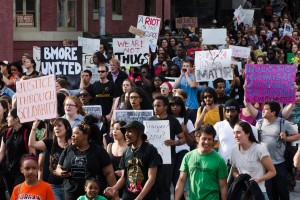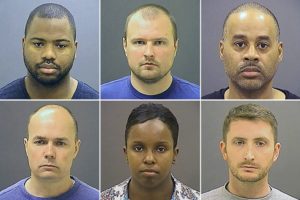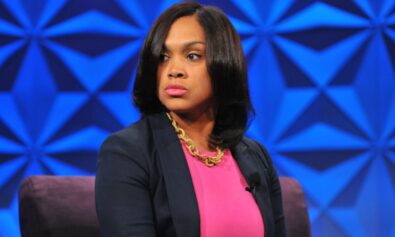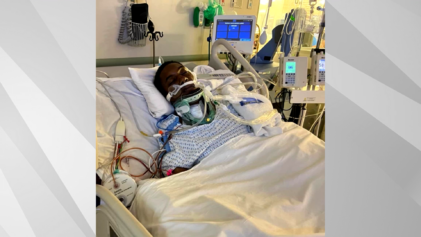
It was a shocking announcement on Friday that finally led to a bit of normalcy returning to the city of Baltimore—all six of the officers involved in Freddie Gray’s arrest and transport would be facing charges related to his death.
That announcement had a drastic impact on the emotional state of a city battling with years of frustration.
As Baltimore Mayor Stephanie Rawlings-Blake addressed reporters, she noted that residents are now in a state of celebration rather than anger.
“What you saw in these last few days with the peaceful demonstrations and people coming together to celebrate Baltimore is that will that we will get better, that we will get through this,” Rawlings-Blake said, as reported by NPR. “And we’ll do it as one Baltimore.”
She added that the Justice Department will work with Baltimore authorities in order to conduct a collaborative review of the Gray case.
With Sunday being declared a day of peace and celebration in the city, Rawlings-Blake felt comfortable lifting the 10 p.m. to 5 a.m. curfew that left many local businesses facing financial hardships.
“My goal has always been to not have the curfew in place a single day longer than was necessary,” Rawlings-Blake added. “I believe we have reached that point today.”
The news was happily received by bar owners and restaurants that were being forced to close their doors during their busiest hours.
Removing the curfew is yet another step the city seems to be making towards getting things as normal as they could be during a time like this.
“It’s going to take a while for us to get totally back to normal, but I think lifting the curfew is a good idea,” said Republican Governor Larry Hogan.
He added that the additional 1,000 officers and 3,000 National Guard troops that had been moved into the city during the riots would now be moved out of the area over the new few days.
It seems to mark an end to at least one turbulent chapter of Baltimore’s history, but experts are warning that there is still a good chance the officers won’t face any jail time.
That warning is one that the people of Baltimore, and the Black community all across the country, probably didn’t need. They know this process all too well.
They have seen many times in the past just how elusive justice can be in officer-involved killings, especially when Black people are the victims.
Eric Garner’s death at the hands of New York police officer Daniel Pantaleo was captured on video and still failed to lead to any arrests.
The investigation surrounding the death of unarmed teen Michael Brown was filled with flaws and yet none of the officers who violated typical protocol were forced to explain themselves.
The reality of the situation is that convictions against officers are rare and in Freddie Gray’s case, one that comes with no video evidence or credible witness testimony of what happened in the back of the transport van, justice could be nothing more than a thwarted dream.
All six of the officers are facing a variety of charges including false imprisonment and second-degree assault charges.
Caesar Goodson, the transport vehicle’s driver, is also facing a second-degree murder count under the legal principle known as “depraved heart.”
The quick decision to file the charges, according to legal experts, could be one of the many signs that the officers won’t face any jail time.
“The decision to file charges was made not based on considerations of justice, but on considerations of crowd control,” Alan Dershowitz, a New York criminal lawyer and professor emeritus at Harvard Law School, told The Huffington Post.
The police union has already moved to use the quick decision as well as comments from the prosecutor, State’s Attorney Marilyn J. Mosby, to suggest that the officers need an independent prosecutor and possibly have the trials moved out of the city of Baltimore.
Seeking a second-degree murder charge is an ambitious move and legal experts insist that if the prosecution can make any of the charges stick, it will be a rare success.
“Typically in police cases, if you get a conviction on almost any of the charges, it’s viewed as successful, because police cases are hard to win,” Glenn Ivey, a defense attorney and the former chief prosecutor in Prince George’s County, Maryland, told The Huffington Post.
Even in a city like Baltimore, jurors tend to view police testimony as more reliable and so far there isn’t much concrete evidence to present at trial.
To further complicate things, a longtime Baltimore defense attorney explained that the officers’ legal teams will likely focus on their particular client’s responsibilities and insist it wasn’t a part of their job to put on Gray’s seatbelt or get medical attention for him.
“If you dissect this from the initial pursuit to the initial detention to the arrest to the transfer vehicle, that’s a pretty complicated timeline,” Andrew Levy told The Huffington Post. “And I think we’re going to hear lots of defense from individuals basically that will distill down to, ‘It wasn’t my job. I was just following orders.’ Those are not frivolous defenses in a context like this. Not everybody is necessarily responsible for everything.”
It is only fair to note, however, that there was suspicious behavior at every step in the timeline including the van making an unreported stop and officers failing to even establish probable cause for Gray’s arrest.
As the nation eagerly awaits the trial, the #BlackLivesMatter creators have been pushing the hashtag #BlackSpring in hopes to remind the country that these are not isolated incidents.
A series of deeply rooted issues contribute to the volatile tensions that exist in impoverished communities like the neighborhoods in Baltimore.
“Black Spring is about really looking at this moment, as not these isolated incidences. … Black people are not a monolithic group, but what we are facing is something that’s extreme — and that’s poverty, that’s homelessness, that’s higher rates of joblessness, that’s law enforcement invading our communities day in and day out — and we are uprising,” Patrisse Cullors, the #BlackLivesMatter co-creator, told The HuffPost Show. “And so this Black Spring is about really talking about a national uprising. We should be honored to talk about this moment.”



